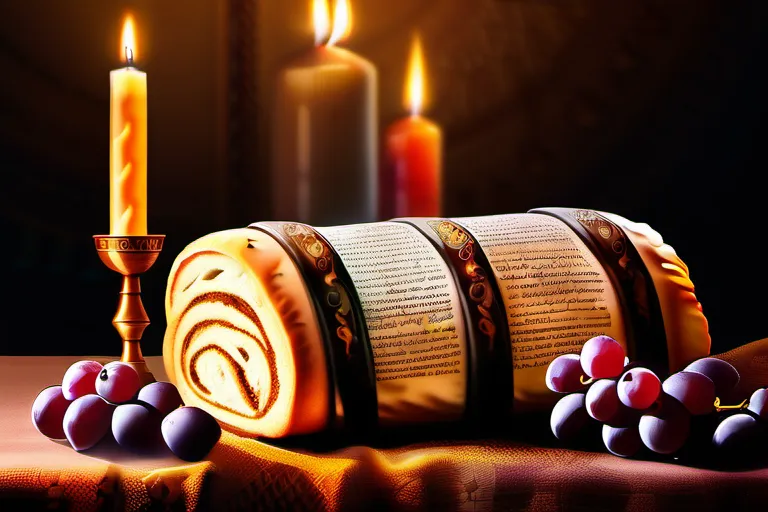Exploring the History, Origins, and Modern Observance of the Jewish Sabbath
Dive into a comprehensive exploration of the Sabbath, one of the most significant religious observances in Judaism. This article will delve into the history, origins, and modern practices surrounding this special day.
The Biblical Origins of the Sabbath
The Sabbath, a day hallowed by centuries-old traditions and deeply rooted in religious texts, holds a unique place in the history of Judaism. But what exactly does it mean to observe the Sabbath? Is it merely a day off from work, or is there more to it than meets the eye?
Imagine a day that resets your soul, much like rebooting a computer after a long session. The Sabbath isn’t just about not working; it’s about reconnecting with something greater. Think of it as a spiritual spa for the human spirit—a day of rest and worship, where you unplug from the chaos of daily life.
Consider the sacredness of this day, woven into the fabric of Jewish history. In the Hebrew Bible, the concept of the Sabbath is introduced with a poetic touch: ‘For in six days the Lord made heaven and earth, the sea, and all that is in them, and rested on the seventh day’ (Exodus 31:17). This verse tells us that God Himself set an example of rest, making it not just a command but a divine act.
The Sabbath isn’t just about stopping; it’s about starting anew. It’s like planting seeds in the fertile ground of your soul, allowing them to grow and bloom without tilling or fertilizing. This day invites you to let go of worldly worries and embrace a moment of peace, much like finding shelter under a tree during a storm.
Moreover, the Sabbath is a time for community. It’s as if every Saturday, the entire nation of Israel gathers in one vast spiritual hall, where everyone belongs—rich or poor, young or old. Here, differences blur, and all are equal before God. This unity symbolizes a unified people, bound together by shared traditions and beliefs.
In essence, the Sabbath is more than just a day; it’s a way of life, a reminder to pause and reflect, to remember our origins, and to find solace in the simplest acts. It’s like finding an oasis in the desert—rest, worship, and renewal, all rolled into one.
So, as you approach this holy day, ponder its significance. Why not use it as a chance to reflect on your own life? To see beyond the mundane and glimpse the divine?
The Commandment of Sabbath Observance
The Commandment of Sabbath Observance: Delve into the Ten Commandments, focusing on the specific commandment that established the Sabbath.
Imagine you’re standing at Mount Sinai, witnessing one of the most pivotal moments in religious history—Moses receiving the Ten Commandments from God. Among them is a command that has deeply influenced millions for millennia: ‘Remember the Sabbath day, to keep it holy.’ But what exactly does this mean? And why did God deem it so essential?
The Sabbath isn’t just another day; it’s a profound reminder of our humanity and connection to something greater. It’s like stepping back into a garden of rest, where we pause from the relentless pace of life. The Sabbath is more than just a religious practice—it’s a sanctuary for the soul.
Some might wonder if the Sabbath isn’t outdated in today’s fast-paced world. But consider this: in a society that often feels like it’s on perpetual autopilot, the Sabbath serves as a powerful reset button. It’s a time when we can recharge, reflect, and reconnect with what truly matters.
Think of it like a flower that needs its petals to close at night for rejuvenation. Without this rest, it wouldn’t bloom fully the next day. Similarly, our minds, bodies, and spirits need this pause to flourish. The Sabbath isn’t just about not working—it’s an invitation to engage in meaningful activities that enrich our lives.
Moreover, the Sabbath is a reminder of God’s ongoing presence in our lives. Just as the sun sets every day, it rises again the next morning—a cycle that mirrors the eternal nature of God and the enduring value of this holy day.
So, why should we keep the Sabbath? Because in observing it, we honor not just a divine command but also a sacred opportunity to find balance, purpose, and peace. The Sabbath is like a lighthouse in the stormy sea of life, guiding us back to our true north.
As we move forward into exploring its role in Jewish life, let’s remember that the Sabbath isn’t just about the past—it’s an ongoing journey, a timeless reminder of the beauty and importance of rest and reflection. In the next chapter, we’ll dive deeper into how this practice has shaped daily life for generations.
The Role of the Sabbath in Jewish Life
The role of the Sabbath in Jewish life is like a beacon guiding the faithful through the week, offering a momentary escape from the mundane and into a realm of spiritual reflection. How can we understand its profound significance without considering the essence of what it means to observe the Sabbath?
Imagine a day where time slows down, allowing for moments of genuine connection with family, community, and the divine. The Sabbath is not just a day of rest; it’s a reminder of the holiness that permeates every aspect of life. By abstaining from work and engaging in prayer, study, and communal gatherings, Jews seek to sanctify their existence.
Throughout history, the observance of the Sabbath has been a cornerstone of Jewish identity. It serves as a daily affirmation of faith, weaving together spiritual disciplines with practical rituals that have evolved over centuries. From lighting candles at dusk to reciting blessings over wine and bread, these acts create a sacred space within the home.
But why is this day so pivotal? Could it be that by setting aside one day each week for rest and reflection, Jews strengthen their commitment to values such as compassion, justice, and peace? The Sabbath, in essence, becomes a microcosm of Jewish ethics, reflecting the belief that humanity’s worth lies beyond material pursuits.
As we explore the rich tapestry of Sabbath observance, it’s clear that this practice is not merely a religious obligation but a powerful tool for shaping character and fostering community. In a world often consumed by the relentless pace of modern life, the Sabbath offers a timeless reminder to pause, reflect, and reconnect with what truly matters.
Modern Observance of the Sabbath
The modern observance of the Sabbath is a rich tapestry woven from ancient traditions and contemporary practices. How do you find yourself participating in this timeless ritual? Do you feel the same sense of holiness that permeates every moment of Shabbat, or has it become just another day on your calendar?
In many homes, the arrival of Friday evening marks the beginning of a sacred time. Families gather to light candles and recite blessings, much like they’ve done for centuries. The act of lighting these special candles is not merely a ritual; it’s a symbol of bringing light into one’s life and home. Is there a particular moment during this ritual that you cherish? Do the flickering flames remind you of any cherished memories or hopes for the coming week?
The traditional Shabbat meal, known as Miluim, is more than just a feast; it’s a communal gathering where hearts are nourished along with the body. The Seder plate and its symbolic foods hold deep meanings, much like a map guiding us through life’s journey. As you sit down to eat, do you think about the stories these dishes tell? Do they inspire you to reflect on your own path or seek understanding?
During Shabbat, many Jews refrain from work and other mundane activities, choosing instead to engage in rest and spiritual reflection. This practice serves as a reminder that our lives should be balanced with moments of stillness and thoughtfulness. In today’s fast-paced world, how do you find time for such introspection? Is there anything specific about the Sabbath that helps you achieve this balance?
The modern observance of Shabbat also includes various customs, from reciting the Kaddish prayer to reading from the Torah. These practices keep alive the traditions passed down through generations. As you engage in these rituals, do they feel like a bridge connecting you to your ancestors and future descendants? Is there a particular custom that stands out as particularly meaningful?
The modern observance of Shabbat reflects both continuity and change. While the core principles remain steadfast, the way we experience and celebrate it can vary greatly from one family or community to another. How do you think personal and communal practices influence each other? Do you believe there’s a balance between maintaining tradition and adapting to new circumstances?
The Sabbath is more than just a day; it’s a moment in time that invites us to pause, reflect, and renew ourselves. As we navigate the complexities of modern life, do you find that keeping the Sabbath helps ground you or provides direction? Is there something about this ritual that resonates deeply with your sense of identity?
The Significance of the Sabbath in Jewish Identity
The Sabbath, often seen as a cornerstone of Jewish identity, serves as more than just a day of rest; it’s a vibrant thread that weaves through the fabric of community life and personal spirituality. How does the Sabbath contribute to our sense of Jewish identity? Is it not like a recurring sunrise, reminding us of our roots while offering solace in the midst of chaos?
Imagine stepping into a synagogue on a Friday evening, where the air is thick with anticipation. The candle lights flicker softly, casting warm glows that seem to embrace you as you join hands with fellow worshippers. This moment, so personal yet profoundly communal, speaks volumes about how the Sabbath strengthens bonds within the Jewish community. It’s not just a day; it’s a sanctuary where everyone finds their place.
Through rituals like kidush, sanctification over wine and bread, we reaffirm our identity as God’s chosen people. Each gesture, from donning special clothes to singing traditional hymns, is a bridge connecting past generations with the present, making the Sabbath an enduring pillar of continuity. In this way, it’s like planting seeds in fertile soil; every year, these rituals grow stronger and more meaningful.
The Sabbath isn’t just about keeping commandments; it’s about creating space for introspection and connection. It challenges us to question our roles within society, fostering a sense of responsibility towards others. By sharing meals with family and friends, we reinforce the importance of chesed, or acts of kindness—something deeply rooted in Jewish values.
So, as we embrace the Sabbath, let’s not just see it as a set of rules but as an open invitation to explore what it means to be Jewish today. It’s a reminder that our identity is dynamic and ever-evolving, shaped by every act of mindfulness and compassion during these holy hours.
In essence, the Sabbath isn’t merely a day; it’s a beacon, guiding us through the complexities of modern life towards a deeper understanding of ourselves and each other. How can we harness this powerful tradition to build a stronger sense of Jewish identity in today’s world?
Reflections on the Meaning of the Sabbath
The Sabbath, that sacred day, has woven itself into the fabric of Jewish life for centuries. It’s not just a day off; it’s a profound experience that transforms time itself, much like how a lens can transform a simple object into a detailed image.
Imagine a world where every week resets to its most pure form—a moment when chaos and routine are momentarily paused. The Sabbath invites us to step back from the relentless stream of daily life and immerse ourselves in a time of reflection, connection, and rejuvenation. How often do we pause long enough to truly appreciate the beauty around us? The Sabbath provides that space, that time capsule, where we can reconnect with our roots, our community, and most importantly, with ourselves.
As I reflect on my own experiences, I see the Sabbath as a mirror. It reflects not only the past but also the present and future. By observing this holy day, we are reminded of our shared heritage and our role within it. The act of lighting candles and sharing meals becomes more than just rituals; they become acts of solidarity. Each gesture, from preparing food to singing prayers, is a thread in the tapestry that binds us together.
The Sabbath also serves as a bridge between different generations. It’s a space where young and old can learn from each other, share stories, and forge connections that transcend the barriers of age. In this time of constant change, the Sabbath offers a timeless sanctuary. It reminds us that amidst all our modern conveniences, there is value in simplicity and tradition.
As I ponder on the importance of the Sabbath, I wonder: How can we carry its spirit into the rest of our lives? Can we find moments of tranquility and connection beyond just one day each week? The answer might lie in finding small ways to integrate these principles—moments of reflection, acts of kindness, and deep connections with those around us. After all, the Sabbath is not confined to just one day but can be a way of life.
Conclusion
 After reading this article, you’ll have a deeper understanding of the Sabbath, its importance to Jews around the world, and how it continues to shape Jewish life today.
After reading this article, you’ll have a deeper understanding of the Sabbath, its importance to Jews around the world, and how it continues to shape Jewish life today.











